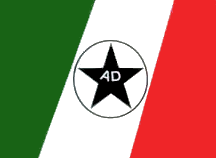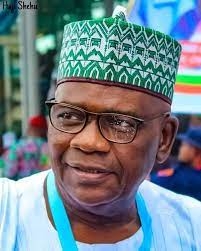
The People's Democratic Party is one of the two major contemporary political parties in Nigeria, along with its main rival, the All Progressives Congress.

Elections in Nigeria involve choosing representatives for the federal government of Nigeria as well as the various states in the Fourth Nigerian Republic. Elections in Nigeria began in 1959 with several political parties. It's a method of choosing leaders for which the citizens have the right to vote and to be voted for. In 2023, Nigerians were getting ready for presidential elections with about 93.4 million eligible voters across the federation.

The Alliance for Democracy is a progressive opposition political party in Nigeria. It was formed on 9 September 1998. At the 2003 legislative elections, the party won 8.8% of the popular vote and 34 out of 360 seats in the Nigerian House of Representatives and 18 out of 109 seats in the Nigerian Senate. The party was reportedly formed to shore up the stake of the Yoruba people in the Nigerian federation following the annulment of the June 12, 1993 presidential election widely believed to have been won by Chief M. K. O. Abiola, a Yoruba multi-millionaire businessman.

The All Progressives Grand Alliance (APGA) is a Nigerian political party formed in June 2002 and has governed the South eastern state of Anambra since 2003.

The All People's Party (APP) is a former Nigerian political party. It was formed in late 1998 during a transition from military to civilian rule by a coalition of associations that received considerable support under the regime of Sani Abacha.
Muhammad Adamu Aliero is a Nigerian politician who is the senator representing Kebbi Central senatorial district since 2015. He previously served in that position from 2007 to 2008. He served as the governor of Kebbi State from 1999 to 2007. He is a member of the Peoples Democratic Party (PDP).
Orji Uzor Kalu is a Nigerian politician and businessman who is the senator representing Abia North Senatorial District. He served as governor of Abia State from 29 May 1999 to 29 May 2007. Kalu is the chairman of SLOK Holding and the Daily Sun and New Telegraph newspapers in Nigeria.

Mohammed Danjuma Goje was a former Governor of Gombe State, Nigeria under the platform of the People's Democratic Party (PDP), taking office on 29 May 2003 during the 2003 Gombe State gubernatorial election. He is now a member of the All Progressives Congress (APC).

The National Party of Nigeria (NPN) was the dominant political party in Nigeria during the Second Republic (1979–1983).

The Nigerian National Assembly delegation from Kano comprises three Senators and fifteen Representatives. They form the legislature of Kano State, Nigeria.
Gbemisola Ruqayyah Saraki is a Nigerian politician who served as the Minister of State for Mines and Steel Development of Nigeria since 6 July 2022 till 29th May 2023. She served earlier as the Minister of State for Transportation from 2019 till she was moved by the President to the Ministry of Mines and Steel Development in 2022.
Danladi Abdullahi Sankara is a Nigerian politician who served as the senator representing the Jigawa North-West senatorial district from 2011 to 2015 and from 2019 to 2023. He is a member of the All Progressives Congress.
Bello Muhammad popularly known as Bello Matawalle is a Nigerian politician and teacher who has served as the minister of state for defence since 2023. He previously served as the governor of Zamfara State from 2019 to 2023.
The 2015 Kwara State gubernatorial election occurred in Nigeria on April 12, 2015. Incumbent APC Governor Abdulfatah Ahmed won re-election for a second term, defeating PDP Simon Ajibola and 15 other party candidates.
The 1991 Kebbi State gubernatorial election occurred on December 14, 1991. NRC candidate Abubakar Musa won the election, defeating SDP Abubakar Koko.
The 2003 Lagos State gubernatorial election occurred on 19 April 2003. Incumbent Governor AD's Bola Tinubu won election for a second term, defeating PDP's Funsho Williams and four other candidates.
The 2019 Nigerian Senate election in Kwara State held on February 23, 2019, to elect members of the Nigerian Senate to represent Kwara State. Ibrahim Yahaya Oloriegbe representing Kwara Central, Suleiman Sadiq Umar representing Kwara North and Yisa Oyelola Ashiru representing Kwara South all won on the platform of All Progressives Congress.
The 2019 Nigerian Senate election in Ebonyi State was held on February 23, 2019, to elect members of the Nigerian Senate to represent Ebonyi State. Michael Ama Nnachi representing Ebonyi South, Obinna Ogba representing Ebonyi Central and Sam Egwu representing Ebonyi North all won on the platform of Peoples Democratic Party.
The 2019 Nigerian Senate election in Gombe State was held on February 23, 2019, to elect members of the Nigerian Senate to represent Gombe State. Bulus Kilawangs Amos representing Gombe South, Mohammed Danjuma Goje representing Gombe Central and Sa'idu Ahmed Alkali representing Gombe North all won on the platform of All Progressives Congress.
Ahmad Adamu Mu'azu CON is a Nigerian politician who served as Governor of Bauchi State from 1999 to 2007.





